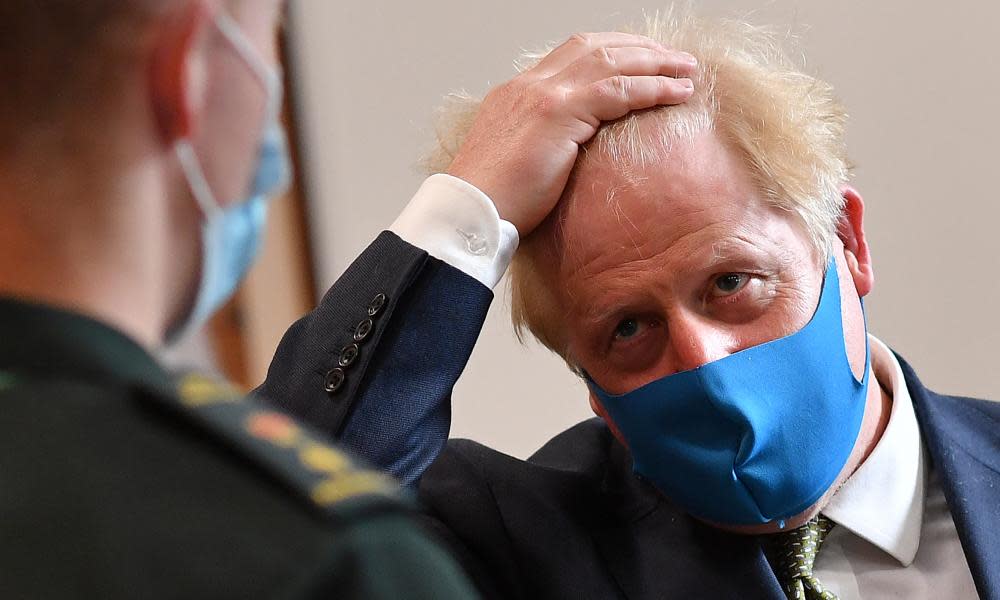After mixed messages and mess-ups, Johnson bows to the inevitable

Making facing coverings in English shops mandatory had increasingly appeared an inevitable next step in the government’s campaign against coronavirus after the prime minister appeared wearing one on Friday, and mused about taking a stricter approach.
On Sunday, Michael Gove denied this was the plan. He said it would be better to trust people’s good sense.
By Monday, it was back to plan A.
In an attempt to explain the mixed messages, Downing Street insiders said the intention had been to announce the change later in the week but, with Labour seizing on Gove’s comments to demand a statement on the issue from Matt Hancock, the grid was ripped up.
Related: Does a man without a mask look tough? No, just vulnerable – and lethal | Suzanne Moore
They dismissed Gove’s comments as a “good old-fashioned fuck up”, rather than an indication of disagreement inside government about the right approach.
As an ardent unionist, Gove may have been partly motivated by not wanting to appear to be following the lead of the Scottish National party’s first minister, Nicola Sturgeon, who made mask-wearing in Scotland’s shops mandatory from Monday.
But coming alongside mixed messaging on whether more workers should be returning to their offices from spare rooms and kitchen tables, it underlined the sense that the public no longer have a clear sense of what is being asked of them.
As the former chancellor George Osborne wrote in his Evening Standard column on Monday: “People have moved on since the high days of lockdown, when everyone knew what was expected of them — and no one asked questions. Now they want answers.”
On face-coverings, there is some justification for Johnson’s claim that the scientific advice has become clearer over time.
Some members of Sage, the government’s scientific advisory body, were initially cautious. They feared it might incentivise people to behave more recklessly and abandon other precautions, such as social distancing, which are deemed more important in controlling the spread of the virus.
default
But a series of papers, including from the British Academy and Royal Society, have pressed home the effectiveness of face coverings, and UK compliance is much lower than that in many other countries – something Johnson suggested in his “people’s PMQs” on Friday that was partly the result of culture.
But it is hardly the first time during the pandemic the government has initially appeared reluctant to use compulsion, preferring instead to try to change behaviour through sharp public messaging and exhortation – before ultimately caving in to reality.
On the way into lockdown, Boris Johnson initially urged the public to avoid “social contact” and “non-essential travel”, while allowing pubs and restaurants to remain open, before forcing them to close a few days later and, three days after that, ordering the nation to “stay at home”.
Similarly, mass public events were initially allowed to go ahead, with scientists suggesting there was only a modest risk of transmission – and then banned as scores of festival organisers and sporting bodies took matters into their own hands and cancelled anyway.
Neither is it the first time Johnson has appeared reluctant to take safety precautions himself: early in the outbreak, he boasted of shaking hands “with everybody” on a hospital visit.
Downing Street continued to hold physical press conferences until 20 March, a week before the prime minister tested positive for the virus himself.
Since returning from his brush with mortality at St Thomas’ hospital, the prime minister has appeared much more cautious – reining in those in his cabinet who had hoped to see an earlier lifting of lockdown restrictions, for example.
But despite ministers making face coverings mandatory on public transport, and advising their use in other confined spaces where distancing is difficult, including shops, the prime minister had not been seen in one himself before last Friday.
Similarly, Rishi Sunak’s summer statement last Wednesday barely mentioned coronavirus, and was geared heavily towards tempting the public back out to shops, bars and restaurants in an attempt to avert a wall of job losses in the coming months.
After revealing his plans to MPs, he carried out a photo-call at a branch of Wagamamas, appearing without a mask – as he had done a month earlier, when he hailed the reopening of non-essential shops by visiting a John Lewis branch and posing on the escalator.
The new rules will not come into effect for more than a week: but if public compliance follows the pattern of many other aspects of lockdown, the public are likely to start following them all but immediately.


